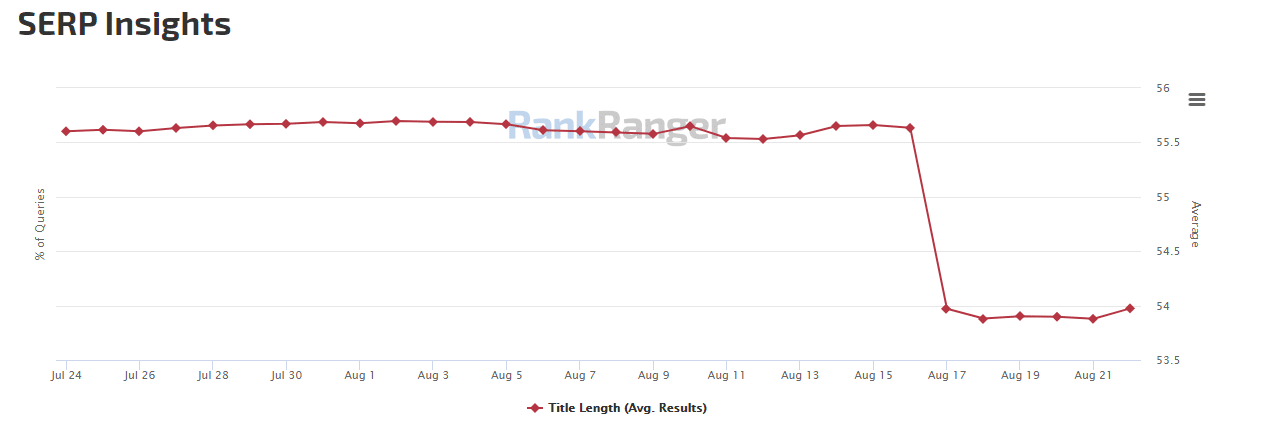Jump to: How did titles change? | Google changing titles is not new | Does this change to titles affect rankings? | Examples of title changes in the SERP
Updated: August 26, 2021
How Did Titles Change?
Beginning around August 17th, 2021, many SEOs and webmasters began to notice that their sites’ <title> tags began to be replaced by <h> tags (and other HTML elements) in Google’s search results. While Google updating titles is not new (as I will cover in the next section), the frequency and impact of the changes to organic titles appeared to be significant.
Google did not officially confirm that an update to titles took place, but their responses over the course of the week implied that a change had in fact taken place (and also that the community feedback would help them to refine the problems resulting from the new changes).
August 26th update: Google has now officially confirmed that an update to how it displays titles took place last week. According to Google, they have launched a new system that determines the best title for a given page using a variety of factors and HTML page elements. Google is also no longer dynamically adjusting titles based on the user’s query. With this new system, Google will select one title and that is the title that will be displayed, regardless of the query.
The RankRanger chart below shows that the average length of <title> tags in mobile search results for all keywords in the RankRanger database dropped from 55.6 to 53.9 on August 17th (thanks to Brodie Clark for the tip).

Chatter on SEO forums and Twitter showed many examples of Google replacing <title> tags in the search results with <h1> and other <h> tags, image alt text, image filenames, internal anchor text, and more. However, some of the updates to titles led to unfavorable results, with new words being inserted, grammar changing, malformed title structures, or ellipses being removed from truncated titles. (See full Twitter discussion)
Google Changing Title Tags is Not New
As many in the SEO community were quick to point out (including me), Google changing title tags is not new. For over a decade, Google has communicated and documented that it may use various HTML page elements and other information to modify titles if it determines that an updated title will better serve the user’s query.
In fact, I first wrote about this in 2013, in an article titled, “Google Thinks Your Title Tags And Meta Descriptions Aren’t Good Enough And Will Display Whatever It Wants Anyway.” At the time, I had observed that Google would often insert brand names into the titles that lacked them, especially for brands’ homepages.
Also, in 2019, I shared some examples of SEO titles where Google was dynamically appending city names on service pages.
All of that said, (and this is only my opinion based on my analysis of the data): the change to titles that took place in August 2021 appears to be more widespread than earlier title changes, which, generally speaking, were more sporadic and harder to notice.
Furthermore, in some cases, the August 2021 title changes led to problematic information in the search results. For example, the White House page for the President, Joe Biden, was switched to a title indicating he is Vice President (as spotted by Jack from Candour Agency). This has since been switched back to the page’s regular <title> tag.
In other examples, the title change appears to have led to malformed titles, especially for new articles:

Does This Change to Titles Affect Rankings?
Because a page’s <title> tag is and always has been a confirmed ranking factor on Google, many SEOs (including myself!) wanted clarification about whether Google would use the keywords in a page <title> for ranking purposes if that title was overwritten. As Glenn Gabe pointed out on Twitter, Google has indicated that the provided HTML <title> will always be used for ranking, regardless of the title being modified in the search results.
However, this update could impact how we use other search features, such as search operators. For example, the intitle: search operator, which pulls up URLs containing certain keywords in their <title> tags, still works the same way, but Google may show a page’s <h1> or another headline in the results after that command is performed.
In the below example, the page’s <title> tag contains the exact phrase “10 Belly Button Pain Causes & More,” but Google still shows the page’s <h1> tag as the title in the SERP. This may create some confusion for SEO professionals who rely on this feature for competitive SEO analysis.

Examples of Changes to the Appearance of Organic Titles in the SERP
I used the keyword rank tracking tool Stat to monitor how titles changed for a variety of queries between August 13 and 21, 2021 (always tracking the query using the same zip code and device).
Below are the overarching changes that appeared to affect titles on Google:
- <title> tags being replaced by <h1> tags or other <h> tags
- Google adding subcategory or breadcrumb names to the middle of title tags
- Google removing elipses from truncated titles
- Google adding numbers or dates to beginning of titles
- Google replacing pipes ( | ) with dashes ( – ) when appending brand names
- Google leveraging image alt text or filenames for titles
- Google (likely unintentionally) adding superscripts or other punctuation found alongside headlines into titles
- In rare cases, Google inserting or modifying titles based on information found elsewhere on the page
Here are some visual examples of the title changes that took place in mid-August, although there are millions more where this came from:









Analyzing your titles:
If you are looking for a method of analyzing the impact of title changes on your domain, the best tool on the market (so far) is Sistrix. Read their article about title updates and how to conduct an analysis using Sistrix.
Have a question? Reach out to @lilyraynyc.
To learn more about the latest in SEO, read our expert team’s newest insights and explore our full suite of SEO services to see how we grow brands and bottom lines as a leading digital marketing agency.






